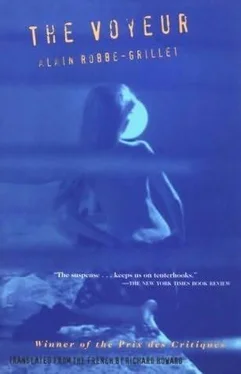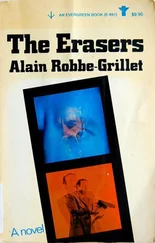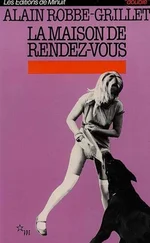Alain Robbe-Grillet - The Voyeur
Здесь есть возможность читать онлайн «Alain Robbe-Grillet - The Voyeur» весь текст электронной книги совершенно бесплатно (целиком полную версию без сокращений). В некоторых случаях можно слушать аудио, скачать через торрент в формате fb2 и присутствует краткое содержание. Город: New York, Год выпуска: 1994, ISBN: 1994, Издательство: Grove Press, Жанр: Современная проза, на английском языке. Описание произведения, (предисловие) а так же отзывы посетителей доступны на портале библиотеки ЛибКат.
- Название:The Voyeur
- Автор:
- Издательство:Grove Press
- Жанр:
- Год:1994
- Город:New York
- ISBN:978-0802131652
- Рейтинг книги:5 / 5. Голосов: 1
-
Избранное:Добавить в избранное
- Отзывы:
-
Ваша оценка:
- 100
- 1
- 2
- 3
- 4
- 5
The Voyeur: краткое содержание, описание и аннотация
Предлагаем к чтению аннотацию, описание, краткое содержание или предисловие (зависит от того, что написал сам автор книги «The Voyeur»). Если вы не нашли необходимую информацию о книге — напишите в комментариях, мы постараемся отыскать её.
A triumphant display of the techniques of the “new novel,”
achieves the impossible feat of keeping us utterly engrossed in the mystery of the child’s murder while systematically raising doubts about whether it really occurred.
The Voyeur — читать онлайн бесплатно полную книгу (весь текст) целиком
Ниже представлен текст книги, разбитый по страницам. Система сохранения места последней прочитанной страницы, позволяет с удобством читать онлайн бесплатно книгу «The Voyeur», без необходимости каждый раз заново искать на чём Вы остановились. Поставьте закладку, и сможете в любой момент перейти на страницу, на которой закончили чтение.
Интервал:
Закладка:
Sitting at the man’s right and facing the girl, at an equal distance from each, Mathias imagined exactly what could be seen from where his neighbor was sitting.… In the fisherman’s cottage, at this moment, he was eating lunch, waiting until it was time for him to continue his rounds. To get here, he had had to walk along the cliff top with his host—the old friend he had met in the village. As for the café, hadn’t he managed to sell one of his wrist watches there?
Nevertheless, these justifications did not manage to satisfy him. Casting back still further, he asked himself what he was doing on the road between the town and the lighthouse, then in the town itself, then earlier still…
What had he been doing, then, since morning? This whole extent of time seemed to him long, uncertain, unaccounted for—not so much, perhaps, because of the small number of items sold, as because of the casual and unsystematic way in which these sales had been conducted, which also applied to the sales that had not succeeded, and even the intervening expeditions.
He would have preferred to go at once. But he could hardly leave his hosts so abruptly, without even knowing if the meal was over. The complete lack of form which presided over the latter’s arrangement prevented the salesman once again from knowing what to do. Here too he found himself unable to act according to any rule he could interpret as applicable—which might serve as an example for his conduct—behind which he could have entrenched himself.
The state of things around him furnished no point of reference: the meal had no more reason to be over than it had to continue. An empty bottle stood next to one that was still untouched (although uncorked); one of the crabs had been scattered about in innumerable shreds of shell, scarcely identifiable now, while the other, still intact, lay as before on its spiny back, its angular legs bent inward toward a central point on the belly where the whitish carapace showed a y -shaped star; about half the potatoes were still left in the casserole.
No one was eating any more, however.
The regular sound of the waves dashing against the rocks at the entrance to the cove almost imperceptibly filled the silence, remotely at first, but soon drowning the whole room in its swelling volume.
The head bent in front of the window, with the light behind it, turned to the left—exposing all four square panes to view—in profile again, but this time in the opposite direction: the forehead toward the darkest corner, the nape of the neck in full light. Just above the black cloth at the nape of the neck, appeared a long, fresh scratch, the kind left by brambles on a skin that is too tender. The tiny pearls of blood along its length seemed to be still wet.
A wave broke, farther off, almost inaudibly—or else it beat, Mathias counted to nine; a wave broke. On the panes the former course of raindrops could be traced in the dust. In front of this window, one rainy day when they had left him alone in the house, he had spent all afternoon drawing a sea gull perched on one of the fence posts at the end of the garden. He had often heard the story before.
The head returned to its original position in front of the panes, above the soup plate full of spider-crab legs broken into tiny red and white fragments.
A wave broke, farther off, almost inaudibly—or else it was only the sound of breathing—the salesman’s, for instance.
He recalled the movement of the water rising and falling against the verfiele embankment.
Nearer, on his own plate, he found the same red and white accumulation of blades and needles. Once again the water covered the marks made by the iron ring.
He was on the point of making the gestures and speaking the words which would automatically lead to his departure—looking at his watch, saying, “It is already such and such an hour,” suddenly standing up and apologizing for having to… , etc.—when the sailor, making a sudden decision, stretched his right hand toward the casserole, seized a potato, and brought it close to his eyes, too close, really, as if to examine it near-sightedly—but with his mind elsewhere, perhaps. Mathias thought he was going to begin peeling it. Nothing of the kind occurred. The tip of his thumb was passed slowly over the surface of a large, gnarled-looking excrescence, then after a few moments more of this silent observation, the potato rejoined the rest in the bottom of the casserole.
“The blight’s starting again,” the fisherman murmured to himself.
Doubtless the preceding subject of conversation was closer to his heart, for he immediately returned to it. He had, he said, run into Maria Leduc, one of the two older girls, who was out looking for her sister Jacqueline “one more time.” He bestowed upon the latter a number of insulting names, of which the most emphatic ranged from “hellcat” to “little vampire”; warming to his subject, he shouted that she would never again set foot in his house, that he was even forbidding her to come near the place, and that he didn’t advise “her” to try seeing her on the sly anywhere else. “Her” was the girl sitting opposite Mathias. She did not react to these threats, even when the man, standing up in anger, leaned across the table as if he were going to strike her.
His violence somewhat abated, he spoke cryptically of the Leduc gill’s crimes—still the same ones—which seemed to the salesman, on this new hearing, even more obscure than they had been before. Instead of a straight-forward account of this or that act, there were only—as usual—involved allusions to matters of a psychological or moral order, lost in an interminable series of consequences and causes among which the responsibilities of the protagonists disappeared altogether.
… Julian, the bakery apprentice, had almost drowned himself the week before. Besides Jacqueline Leduc, several other people were involved, if not with the event, at least with the story the sailor told about it; in particular, a young fisherman called “little Louis” and his fiancee—“his ex-fiancee,” to be more exact, since she now refused to marry him. Louis was just twenty, Julian was two years younger. A quarrel had broken out between them on Sunday evening….
But Mathias could not determine to what degree the girl was the subject of this quarrel, nor whether it was a matter of attempted murder or attempted suicide, or merely an accident. The fiancee’s role was not confined, furthermore, merely to breaking off her engagement (she had probably only threatened to break it off); as for the older friend who had repeated to the baker’s apprentice his rival’s words—distorting them somewhat, it seemed…
It seemed to Mathias that the sailor was particularly irritated with the two youths for not agreeing to drown the girl. Lest he be suspected of avoiding the discussion of Violet’s misdeeds and their necessary punishment, the salesman did not dare manifest his eagerness to continue on his way. He even decided it would look better if he took an active part. His host having started on a eulogy of “that poor Leduc woman,” Mathias decided to tell about his morning visit to the three girls’ mother; as he did not recall a single detail concerning the approaching marriages of the two older daughters, he was constrained to improvise. Then he mentioned his friendship with their uncle Joseph, who worked for the steamship line in the city. Speaking of a recent conversation he had had with the latter on the quay, just before sailing, he proceeded quite naturally to a complete account of his day. He had got up, he said, very early in order to catch the boat, for he had to make the long trip between his house and the harbor on foot. He had walked fast, without stopping once. He had arrived a little too early to go on board, and had taken advantage of the remaining time to sell his first watch to a sailor of the line. He had been less fortunate since landing on the island—at least at first. Altogether, though, he couldn’t complain about his morning—thanks of course to the pains he took to prepare his sales trips in every detail. According to his plans made the day before, he had begun with the houses along the harbor; having then rented a good bicycle, he had headed toward Black Rocks, stopping at every door, and even leaving the main road here and there to visit isolated dwellings whenever it seemed worth it. That was how he had happened to sell one of his finest models at the Marek farm. All these side-trips took a negligible amount of time, for the bicycle he had rented worked perfectly—it was a real pleasure to ride on it. The sales themselves were sometimes transacted with astonishing speed: it was enough to open his suitcase, and the quality of the merchandise immediately gained him customers. Press the clasp, open the cover, etc…. This had happened, for example, in the case of the couple who lived along the road just before you reached the village at the lighthouse. A little farther on, at the village café, the salesman had just sold another watch and was getting ready to have his lunch, when he met his old friend Jean Robin, and had immediately been invited here for lunch.
Читать дальшеИнтервал:
Закладка:
Похожие книги на «The Voyeur»
Представляем Вашему вниманию похожие книги на «The Voyeur» списком для выбора. Мы отобрали схожую по названию и смыслу литературу в надежде предоставить читателям больше вариантов отыскать новые, интересные, ещё непрочитанные произведения.
Обсуждение, отзывы о книге «The Voyeur» и просто собственные мнения читателей. Оставьте ваши комментарии, напишите, что Вы думаете о произведении, его смысле или главных героях. Укажите что конкретно понравилось, а что нет, и почему Вы так считаете.












